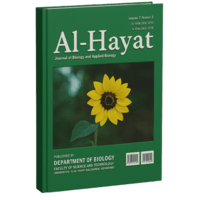About the Journal
Journal Information

|
|
Journal title | Al-Hayat: Journal of Biology and Applied Biology |
| Initials | AH | |
| Frequency | 2 issues per year (May and November) | |
| DOI | 10.21580/ah by by |
|
| ISSN | 2622-0725 (online); 2654-3702 (printed) | |
| Editor-in-chief | Dr. Dian Ayuningtyas, M.Biotech. | |
| Publisher | Department of Biology, UIN Walisongo Semarang | |
| Citation | Google Scholar l DOAJ l Dimensions |
Al-Hayat: Journal of Biology and Applied Biology, first published in August 2018, is a journal that focuses on various subjects on biological sciences. It is intended to communicate original research in current issues on the subject. The subjects cover biology field studies and literature with various perspectives, both interdisciplinary and multidiscipline, as follows: Zoology, Botany, Ecology, Biotechnology, Microbiology, Molecular Biology, Genetics, Ethnobiology, and other Biological Sciences.
Al-Hayat is published by the Department of Biology, Faculty of Science and Technology, Universitas Islam Negeri Walisongo Semarang Indonesia, in collaboration with Konsorsium Biologi Indonesia (KOBI). This journal is managed to be issued twice in a year. We warmly welcome contributions from fellow scholars and researchers of multiple disciplines.
As a member of CrossRef, Al-Hayat: Journal of Biology and Applied Biology guarantees that all of its featured articles bear a unique DOI number.
Based on the assessor's comments on the previous accreditation we made several improvements including:
- Collaborating with Konsorsium Biologi Indonesia (KOBI),
- Completing author affiliations from study programs, faculties, and universities,
- Starting from volume 4 number 1 2021 we made changes to the full-text layout design (template).
- Begin in volume 5 no. 1, all accepted manuscripts are only in English.
____________________________________________________________
This journal has been indexed by:



_1.png)
_2.png)

_1.png)
_1.png)
_3.png)
_3.png)

